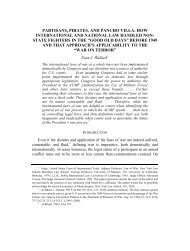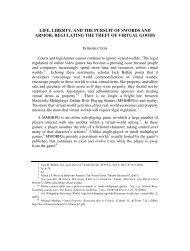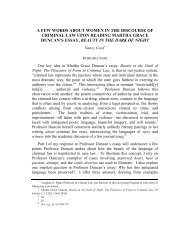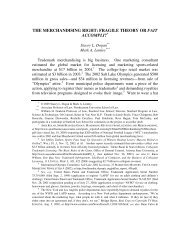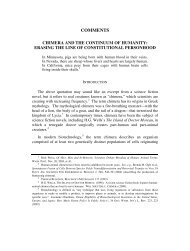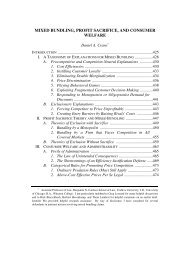The Hidden Influence of Jewish Law on the - Emory University ...
The Hidden Influence of Jewish Law on the - Emory University ...
The Hidden Influence of Jewish Law on the - Emory University ...
You also want an ePaper? Increase the reach of your titles
YUMPU automatically turns print PDFs into web optimized ePapers that Google loves.
1404 EMORY LAW JOURNAL [Vol. 57<br />
<str<strong>on</strong>g>Jewish</str<strong>on</strong>g> sources were c<strong>on</strong>sulted, <strong>the</strong>y were not cited. I wish to show what I<br />
think is <strong>on</strong>e such example—<strong>the</strong> enigmatic origins <str<strong>on</strong>g>of</str<strong>on</strong>g> <strong>the</strong> comm<strong>on</strong> law rule that<br />
<strong>the</strong> holder <str<strong>on</strong>g>of</str<strong>on</strong>g> lost property might be a bailee for hire and not a gratuitous<br />
bailee.<br />
<str<strong>on</strong>g>The</str<strong>on</strong>g> Holder <str<strong>on</strong>g>of</str<strong>on</strong>g> Lost Property as a Bailee<br />
One who picks up a lost object prior to aband<strong>on</strong>ment does not take<br />
complete title to <strong>the</strong> object according to both <str<strong>on</strong>g>Jewish</str<strong>on</strong>g> and comm<strong>on</strong> law. 2<br />
Ra<strong>the</strong>r, a bailment is created as <strong>the</strong> finder is entrusted to hold <strong>the</strong> property for<br />
its true owner. But what type <str<strong>on</strong>g>of</str<strong>on</strong>g> bailment is created, and with what level <str<strong>on</strong>g>of</str<strong>on</strong>g><br />
liability? In general, <str<strong>on</strong>g>Jewish</str<strong>on</strong>g> law recognizes essentially three categories <str<strong>on</strong>g>of</str<strong>on</strong>g><br />
bailment, each with varying degrees <str<strong>on</strong>g>of</str<strong>on</strong>g> resp<strong>on</strong>sibility: (1) <strong>the</strong> gratuitous bailee,<br />
who is liable <strong>on</strong>ly for outright negligence; (2) <strong>the</strong> bailee for hire, who is also<br />
liable for <strong>the</strong>ft or loss; and (3) <str<strong>on</strong>g>The</str<strong>on</strong>g> borrower, who is virtually an insurer, and<br />
liable for almost all mishaps which may befall <strong>the</strong> article. 3<br />
Similarly, although <strong>the</strong> comm<strong>on</strong> law traditi<strong>on</strong> has a number <str<strong>on</strong>g>of</str<strong>on</strong>g> terms to<br />
describe various scenarios in which <strong>on</strong>e is entrusted with <strong>the</strong> property <str<strong>on</strong>g>of</str<strong>on</strong>g><br />
ano<strong>the</strong>r, it essentially recognizes three categories <str<strong>on</strong>g>of</str<strong>on</strong>g> bailments (excluding<br />
excepti<strong>on</strong>al obligati<strong>on</strong>s created by law): (1) gratuitous bailments for <strong>the</strong><br />
bailor’s sole benefit (e.g., <strong>the</strong> unpaid watchman); (2) gratuitous bailments for<br />
<strong>the</strong> bailee’s sole benefit (e.g., <strong>the</strong> borrower); and (3) bailments for mutual<br />
benefit (including <strong>the</strong> watchman for hire and <strong>the</strong> renter). 4 <str<strong>on</strong>g>The</str<strong>on</strong>g> rights and<br />
resp<strong>on</strong>sibilities <str<strong>on</strong>g>of</str<strong>on</strong>g> <strong>the</strong> bailee in each <str<strong>on</strong>g>of</str<strong>on</strong>g> <strong>the</strong>se categories—including liability for<br />
<strong>the</strong> object in questi<strong>on</strong>—though different from <str<strong>on</strong>g>Jewish</str<strong>on</strong>g> law, likewise vary by<br />
classificati<strong>on</strong>. Clearly in <strong>the</strong> case <str<strong>on</strong>g>of</str<strong>on</strong>g> holding <strong>on</strong> to lost property, <strong>the</strong> bailment<br />
is not to <strong>the</strong> sole benefit <str<strong>on</strong>g>of</str<strong>on</strong>g> <strong>the</strong> finder. But what <str<strong>on</strong>g>of</str<strong>on</strong>g> <strong>the</strong> remaining two<br />
categories—is <strong>the</strong> bailment created a very limited bailment, like a gratuitous<br />
bailee, or is it <strong>the</strong> more rigorous bailment for hire?<br />
<str<strong>on</strong>g>The</str<strong>on</strong>g> <str<strong>on</strong>g>Jewish</str<strong>on</strong>g> <str<strong>on</strong>g>Law</str<strong>on</strong>g><br />
<str<strong>on</strong>g>The</str<strong>on</strong>g> Talmud cites two opini<strong>on</strong>s c<strong>on</strong>cerning <strong>the</strong> category <str<strong>on</strong>g>of</str<strong>on</strong>g> bailment created<br />
when <strong>on</strong>e finds lost property and holds it for its true owner. <str<strong>on</strong>g>The</str<strong>on</strong>g> Talmud<br />
2 See Michael J. Broyde & Michael Hecht, <str<strong>on</strong>g>The</str<strong>on</strong>g> Return <str<strong>on</strong>g>of</str<strong>on</strong>g> Lost Property According to <str<strong>on</strong>g>Jewish</str<strong>on</strong>g> & Comm<strong>on</strong><br />
<str<strong>on</strong>g>Law</str<strong>on</strong>g>: A Comparis<strong>on</strong>, 12 J.L. & RELIGION 225, 239–41 (1995–96).<br />
3<br />
BAVA MEZIA 93a; Moses Maim<strong>on</strong>ides, MISHNEH TORAH, Hiring [<str<strong>on</strong>g>of</str<strong>on</strong>g> Workers], 1:1–2.<br />
4 19 SAMUEL WILLISTON & RICHARD A. LORD, A TREATISE ON THE LAW OF CONTRACTS § 53:3 (4th ed.<br />
2001).




